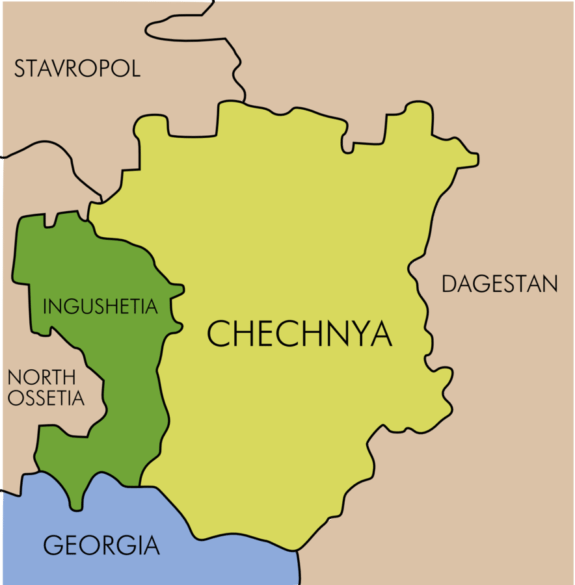
April 21, 2017; New York Times
It’s being described as a pogrom, a purge, and a mass cleansing. A New York Times investigation brought the world’s attention last week to an ongoing roundup of gay men in the Republic of Chechnya, a “federal subject” of Russia and in a region already under scrutiny for human rights abuses.
According to Human Rights Watch, the disturbing wave of violence and torture was first reported by a local newspaper in Chechnya on April 1st:
For several weeks now, a brutal campaign against LGBT people has been sweeping through Chechnya. Law enforcement and security agency officials under control of the ruthless head of the Chechen Republic, Ramzan Kadyrov, have rounded up dozens of men on suspicion of being gay, torturing and humiliating the victims. Some of the men have forcibly disappeared. Others were returned to their families barely alive from beatings. At least three men apparently have died since this brutal campaign began.
The reports drew fire from around the world, including this statement from Nikki Haley, U.S. ambassador to the UN.
We continue to be disturbed by reports of kidnapping, torture, and murder of people in Chechnya based on their sexual orientation and those persecuted by association. If true, this violation of human rights cannot be ignored—Chechen authorities must immediately investigate these allegations, hold anyone involved accountable, and take steps to prevent future abuses.
Haley’s statement was a welcome change in course for the Trump administration, which downplayed the U.S. State Department’s annual human rights report issued earlier this year, raising questions about the country’s role as a human rights watchdog for the world.
As the New York Times explained, “Homosexuality is taboo in Chechnya and the mostly Muslim surrounding areas of the Caucasus region in southern Russia.” But, after a gay rights group based in Russia applied for permits for a gay pride parade in the region, the roundup began.
The men were held for as little as a day or as long as several weeks, according to Human Rights Watch and to interviews with gay men who later escaped the region…among the fatalities documented by the organization were one man who succumbed during torture and two others who died in “honor killings” by relatives after the police released them.
Sign up for our free newsletters
Subscribe to NPQ's newsletters to have our top stories delivered directly to your inbox.
By signing up, you agree to our privacy policy and terms of use, and to receive messages from NPQ and our partners.
The response from the Kremlin, not surprisingly, was to dismiss the evidence that Chechen police had arrested gay men. And, as the New York Times reported, victims of the attacks were forced to turn to Russian civil society for help.
Fearing for his life, Maksim turned to a gay rights group, the Russian LGBT Network, based in St. Petersburg, which has established an emergency, round-the-clock volunteer group to help gay men escape the region. To reassure the victims they are trying to help, the activists have taken extraordinary precautions, operating virtually as a partisan cell behind enemy lines, though they have done nothing illegal under Russian law. After arriving at the safe location outside Chechnya, several young men said they had suspected that the volunteer group was also a trap but had no other option but to accept the help.
Human Rights Watch called on Russian leaders to intervene.
LGBT people are in danger not only of persecution by the authorities but also of falling victim to “honor killings” by their own relatives for tarnishing family honor… So it is particularly disappointing that the Kremlin spokesman should tell the victims to use official channels to complain, without saying a word about any security guarantees… Surely Russian authorities can do better than that. At the highest level, they should resolutely condemn attacks against LGBT people in Chechnya and ensure safety and justice for the victims.
It seems to be an increasingly frightening time for civil society and human rights, as countries like Hungary, Turkey, India, and others clamp down on freedoms. And, rights for LGBTQ citizens are particularly fragile, even in the U.S., where transgender women of color have been murdered at an alarming rate in 2017, according to GLAAD, and civil rights leaders recently reported dismaying meetings with U.S. Attorney General Jeff Sessions.
As the Boston Globe editorialized Sunday, other countries now need to fill the void:
Pressure must also come from the world community to push Russia to stop its relentless oppression. The United States, which might normally pursue such a dialogue, is unfortunately saddled with its most antigay administration in decades, and will likely do nothing to help. With lives at stake, this is a morally unsound position, with destructive consequences. History has proved time and again that silence and inaction work only to the benefit of tyrants, and leave the most vulnerable susceptible to persecution, devastation, and death.
—Anna Berry











